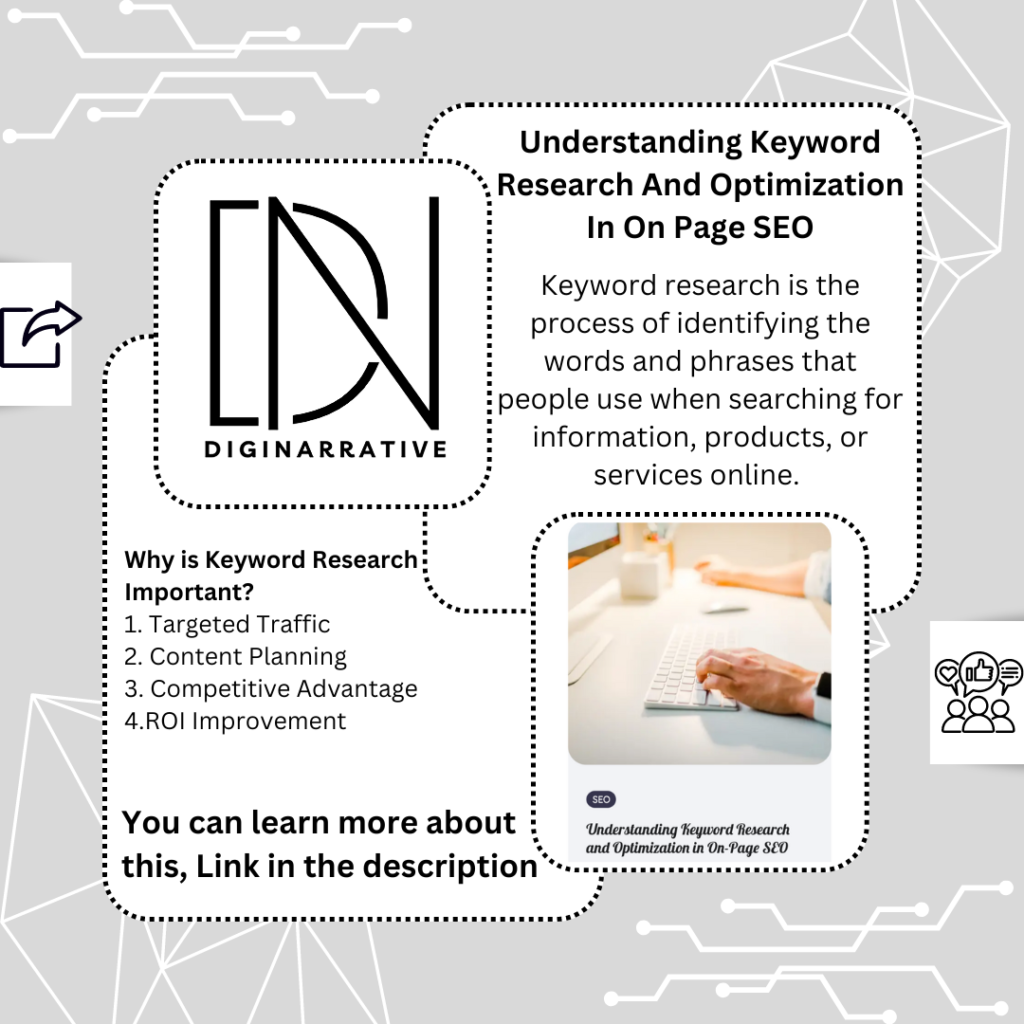
When it comes to optimizing your website for search engines, one of the most important aspects is keyword research and optimization. In this blog post, we will delve into what keyword research and optimization entail, and how they contribute to on-page SEO.
What is Keyword Research?
Keyword research is the process of identifying the words and phrases that people use when searching for information, products, or services online. It involves understanding the language and vocabulary of your target audience and finding the most relevant and valuable keywords to target.
Effective keyword research helps you gain insights into your audience’s search behavior, allowing you to create content that aligns with their needs and interests. By targeting the right keywords, you increase the chances of your website appearing in search engine results pages (SERPs) and attracting organic traffic.
Why is Keyword Research Important?
Keyword research is the foundation of any successful SEO strategy. It helps you understand the demand for specific topics, products, or services in your industry. By identifying high-volume and low-competition keywords, you can optimize your website to rank higher in search engine results.
Here are a few reasons why keyword research is crucial:
Targeted Traffic:
By targeting the right keywords, you attract users who are actively searching for what you offer. This increases the likelihood of converting them into customers.
Content Planning:
Keyword research helps you identify popular topics and trends in your industry, allowing you to create relevant and engaging content that resonates with your target audience.
Competitive Advantage:
Understanding the keywords your competitors are targeting can give you an edge. By identifying untapped keyword opportunities, you can outrank your competition and attract more organic traffic.
ROI Improvement:
By focusing on keywords that have high commercial intent, you increase the chances of driving qualified leads and improving your return on investment (ROI).
What is Keyword Optimization?
Keyword optimization, also known as on-page SEO, is the process of strategically incorporating target keywords into various elements of your website to improve its visibility in search engine results.
Here are some key areas where keyword optimization plays a significant role:
Page Titles and Meta Descriptions
Page titles and meta descriptions are HTML elements that appear in search engine results. Including relevant keywords in these elements helps search engines understand the content of your page and improves the likelihood of your website being clicked.
Headers and Subheadings
Using keywords in headers and subheadings not only helps search engines understand the structure and context of your content but also makes it more readable and scannable for users.
URLs and Internal Links
Including keywords in URLs and anchor text of internal links helps search engines determine the relevance of your content and improves the overall user experience.
Content Body
Creating high-quality, informative, and keyword-rich content is essential for on-page optimization. By naturally incorporating keywords throughout your content, you increase its relevance and visibility in search results.
Image Alt Text
Adding descriptive alt text to your images can help search engines understand the visual content and improve its accessibility. Including relevant keywords in alt text can also contribute to keyword optimization.
10 Tools That Help Keyword Research and Optimization
Keyword research is fundamental to successful on-page SEO. It allows you to understand what users are searching for and how to effectively position your content. Various tools can simplify this process, providing insights and analytics to optimize your strategy. Here are ten essential tools to consider for keyword research and on-page SEO optimization.
1. Google Keyword Planner
A great starting point for keyword research, Google Keyword Planner helps you discover new keyword ideas while offering historical statistics, search volume, and competition levels. This tool is free and especially useful for PPC campaigns.
2. SEMrush
SEMrush is a comprehensive SEO tool that provides keyword research, site audit functions, and competitive analysis. It’s particularly effective in discovering keyword variations and assessing the SEO potential of keywords.
3. Ahrefs
Ahrefs is renowned for its robust backlink analysis features. The keyword explorer tool provides insights on search volume, keyword difficulty, and potential traffic, making it invaluable for on-page optimization strategies.
4. Moz Keyword Explorer
With its user-friendly interface, Moz Keyword Explorer offers keyword suggestions along with search volume data and organic CTR. The tool’s ‘Priority’ score helps you identify valuable keywords to target.
5. Ubersuggest
Ubersuggest provides keyword ideas and competitive analysis for both SEO and content marketing. Its features enable you to gauge latest trends in keyword searches, making it easier to refine your strategy.
6. AnswerThePublic
This tool is excellent for understanding the questions people are asking around specific topics. AnswerThePublic generates visualizations and can help you uncover long-tail keywords and content ideas.
7. Keyword Tool
Keyword Tool allows you to generate long-tail keyword suggestions using Google Autocomplete. This is particularly useful if you want to uncover keywords that may not be in mainstream usage but are still valuable.
8. SpyFu
SpyFu offers insights into the keywords your competitors are using and how successfully they rank. This can inform your on-page SEO efforts and help you identify missed opportunities.
9. Long Tail Pro
As its name suggests, Long Tail Pro is focused specifically on long-tail keywords. This tool helps optimize your content for niche searches, often resulting in easier rankings with targeted traffic.
10. Google Trends
Monitor the popularity of specific search terms over time with Google Trends. This tool can help you identify seasonal trends, making it essential for timely and relevant content creation.
In conclusion, utilizing these ten tools will greatly enhance your keyword research and on-page SEO optimization efforts. By integrating their insights, you can significantly improve your content’s visibility and performance.
Conclusion
Keyword research and optimization are integral parts of on-page SEO. By understanding the language and search behavior of your target audience, you can create content that aligns with their needs and attracts organic traffic. Incorporating keywords strategically throughout your website’s elements helps search engines understand and rank your content, ultimately improving your visibility and driving more qualified traffic to your website.





